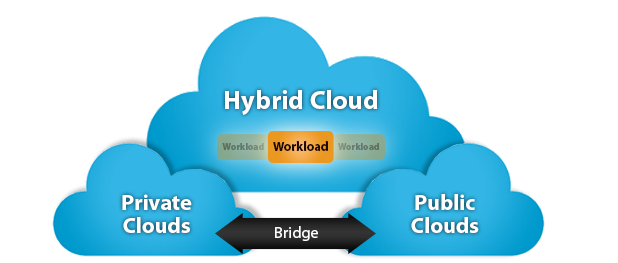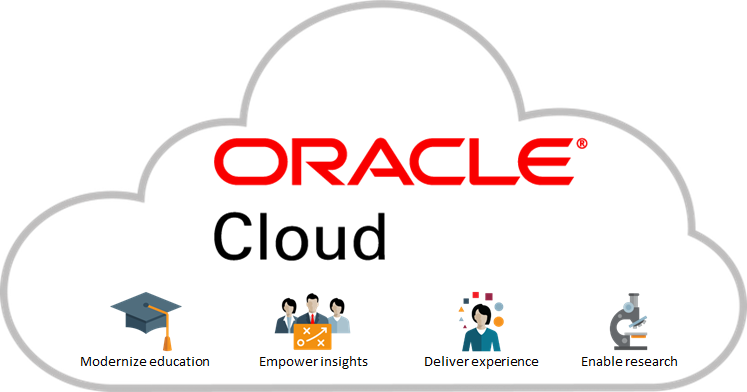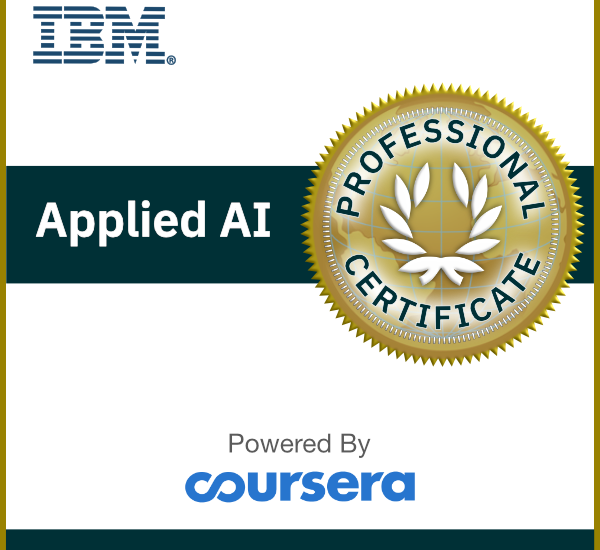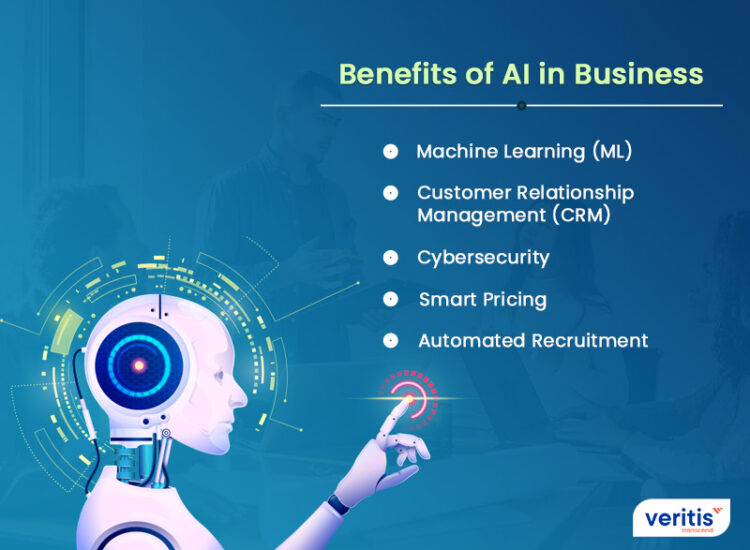When it comes to managing customer relationships, having a reliable Customer Relationship Management (CRM) system in place is crucial for small businesses. A good CRM can help streamline processes, improve communication with customers, and increase sales and revenue.
Toc
- 1. Introduction to CRM
- 2. Factors to Consider When Choosing a CRM for Small Businesse
- 3. Popular CRMs for Small Businesse
- 4. Comparative Analysis of Leading CRM System
- 4.1. User-Friendliness: A Look at the Interface
- 4.2. Customization: Tailoring the CRM to Fit Your Business
- 4.3. Pricing Plans: Finding the Right Fit for Your Budget
- 4.4. Integration Capabilities: Streamlining Operations
- 4.5. Support and Training: Ensuring Smooth Adoption
- 4.6. Automation and Efficiency: Reducing Manual Tasks
- 4.7. Security Measures: Protecting Customer Information
- 4.8. Analytics and Reporting: Gaining Insights for Growth
- 5. Future of CRM for Small Business – Top trends to watc
- 6. Conclusio
But with so many options available on the market, how do you choose the best CRM for your small business? In this comprehensive guide, we will walk you through everything you need to know before making a decision.
Introduction to CRM
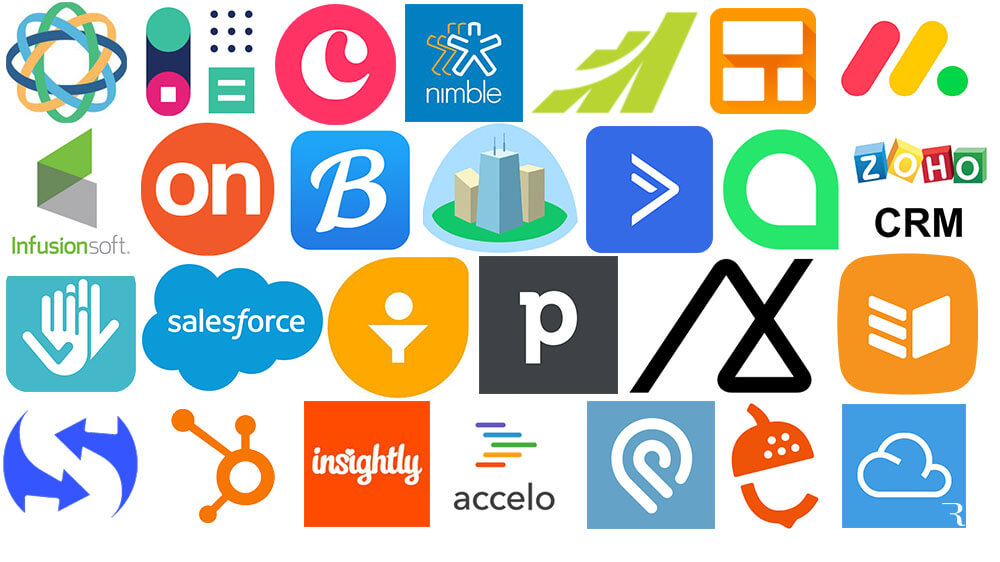
CRM is a software system that helps businesses manage interactions with customers, track leads and sales, and store customer information and data. It provides a holistic view of a business’s relationship with their customers and helps improve customer satisfaction.
There are various types of CRM systems available, including cloud-based, on-premise, and open-source. Each type has its own advantages and disadvantages, depending on the specific needs of your business.
What is a CRM?
A CRM is a technology that helps businesses manage interactions with potential and existing customers. It allows companies to store customer information and track their interactions throughout the customer journey.
In simple terms, a CRM acts as a central hub for all customer-related data, providing a 360-degree view of customer interactions and activities. This enables businesses to have a better understanding of their customers and tailor their marketing and sales efforts accordingly.
Importance of CRM for Small Businesses
In today’s competitive market, managing customer relationships effectively is crucial for small businesses aiming to grow and succeed. A Customer Relationship Management (CRM) system can be a game-changer, helping businesses streamline operations, improve customer service, and boost sales. But with so many options available, how do you choose the best CRM for your small business?
Overview of Key Features to Consider
When selecting a CRM, it’s important to consider features that align with the specific needs of small businesses:
- User-friendly interface for easy adoption.
- Customizable to fit various industries.
- Cost-effective pricing plans to suit budget constraints.
- Integration capabilities with popular tools.
- Robust customer support for smooth setup and usage.
- Automation features to reduce manual tasks.
- Data security measures to protect sensitive information.
- Analytics and reporting tools to track performance.
Benefits of Using CRM for Small Businesses
There are numerous benefits of implementing a CRM system for small businesses, including:
- Improved communication with customers: With all customer information stored in one place, it becomes easier to communicate with them through various channels.
- Streamlined processes: A CRM can automate tasks such as lead generation and email marketing, saving time and reducing human error.
- Increased efficiency: With access to real-time data and reports, businesses can make informed decisions quickly.
- Better customer relationships: By having a complete view of customer interactions, businesses can provide personalized and targeted services to improve customer satisfaction.
- Increased sales and revenue: With a better understanding of customer needs and behaviors, businesses can tailor their marketing and sales efforts to convert more leads into sales.
Factors to Consider When Choosing a CRM for Small Businesse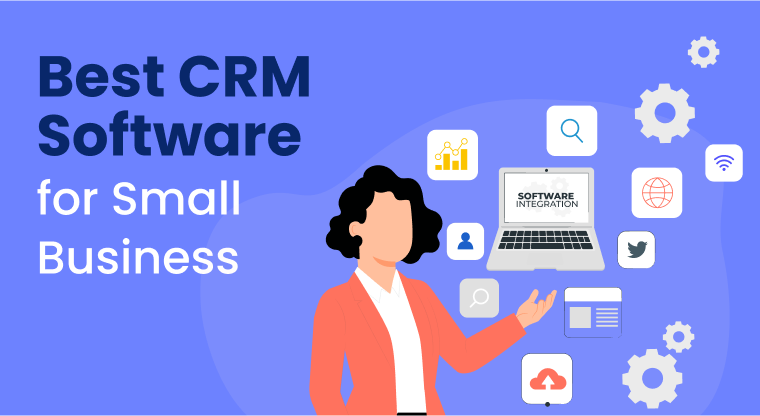
Before selecting a CRM for your small business, consider the following factors:
1. Business Needs
The first step in choosing the right CRM is identifying the specific needs of your business. This will help you determine which features and functionalities are necessary for your business operations.
For example, if you have a small team, you may not need advanced automation features, but if you have a large sales team, it may be essential to have lead scoring and workflow management capabilities.
2. Budget
Budget is a key consideration when selecting a CRM system. Different solutions have varying pricing structures, including monthly subscriptions, one-time fees, or pay-per-use models. It’s essential to evaluate the total cost of ownership, which includes not only the initial purchase price but also ongoing maintenance, training, and support costs. Small businesses should look for a CRM that provides the best value while fitting within their financial constraints. Take advantage of free trials and demos to assess whether a CRM’s features justify its cost before making a commitment.
3. Ease of Use
User-friendliness is critical for ensuring that your team can effectively utilize the CRM system. A complicated interface can lead to resistance from employees and hinder the adoption of the new software. Look for a CRM that offers intuitive navigation, straightforward data entry, and easily accessible training resources. Ideally, the CRM should facilitate a smooth transition by minimizing the learning curve for all team members.
4. Integration Capabilities
A CRM should be able to integrate with other business tools and systems, such as email marketing platforms, accounting software, and e-commerce platforms. This enables businesses to have a centralized system for managing all customer data and streamlining processes across different departments.
5. Scalability
As your business grows, your CRM needs may change. It’s crucial to choose a system that can scale with your business needs and accommodate an increasing volume of customer data without compromising performance.
Popular CRMs for Small Businesse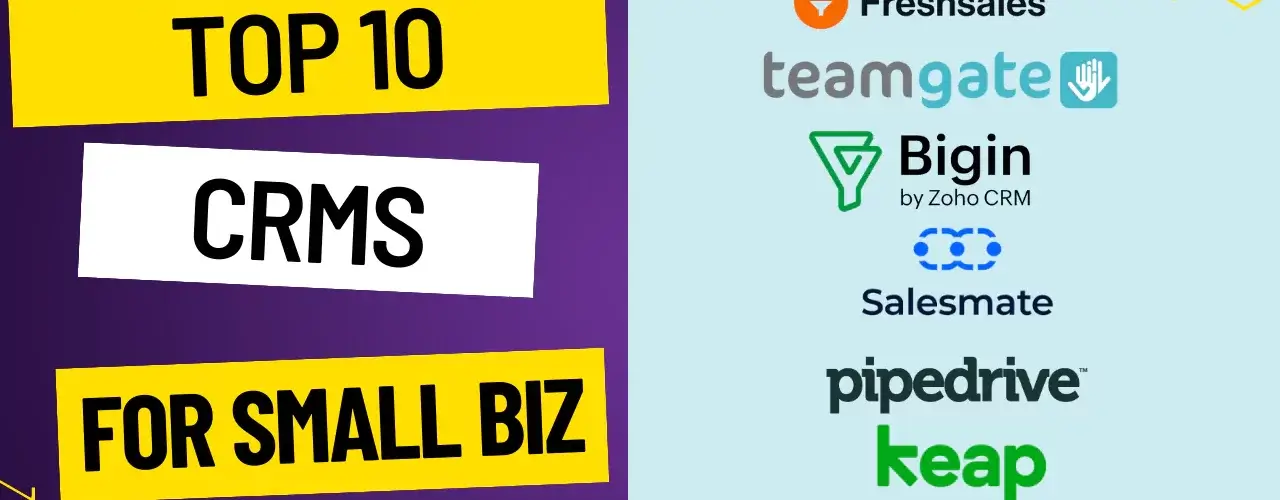
Now that you understand the key factors to consider when choosing a CRM, here are some popular options for small businesses:
Salesforce CRM
Salesforce is one of the most widely used CRM platforms, known for its robust features and extensive customization options. It offers a cloud-based solution that allows small businesses to manage customer relationships seamlessly. Key features include advanced reporting, lead management, and marketing automation tools designed to enhance sales and customer engagement. Additionally, Salesforce provides an app marketplace called AppExchange, where users can find thousands of third-party applications to further enhance the CRM’s capabilities. With its scalability, Salesforce can grow with your business, making it a popular choice for companies aiming for long-term expansion.
HubSpot CRM
HubSpot CRM is another excellent choice for small businesses, particularly those seeking a free solution with powerful capabilities. It provides a user-friendly interface that helps teams track and manage leads and customer interactions effortlessly. HubSpot offers features such as email tracking, pipeline management, and analytics, making it easy to understand customer behaviour and optimize sales strategies. The platform integrates smoothly with other HubSpot marketing tools, allowing users to tie in marketing efforts with sales tracking effectively. For small businesses looking to get started with CRM without immediate costs, HubSpot CRM presents a compelling option.
Zoho CRM
Zoho CRM is a cost-effective solution that caters specifically to the needs of small to medium-sized businesses. With its flexible pricing plans, Zoho CRM provides a wide range of features, including sales automation, workflow management, and customer analytics. The platform’s strong integration capabilities enable businesses to connect with other tools they already use, from email clients to accounting software. Zoho also offers advanced customization options, allowing small business owners to tailor the CRM to their specific requirements, which is crucial for building customer relationships that lead to increased loyalty and satisfaction.
Microsoft Dynamics 365
Microsoft Dynamics 365 is a comprehensive CRM and ERP solution that offers small businesses powerful tools to manage their operations. It provides features such as sales automation, customer service management, and marketing insights, all within a familiar Microsoft ecosystem. This integration greatly benefits businesses already using Microsoft products like Office 365. While it may be more complex and suited for businesses with larger teams, Dynamics 365’s extensive functionalities can lead to greater insights and streamlined operations as companies grow. Its adaptability makes it a worthwhile consideration for those seeking an all-in-one solution.
Comparative Analysis of Leading CRM System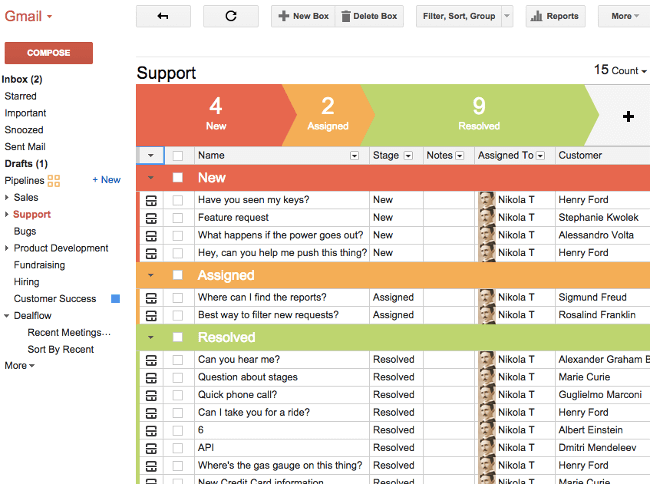
User-Friendliness: A Look at the Interface
|
CRM System |
Interface Description |
Learning Curve |
|---|---|---|
|
HubSpot CRM |
Intuitive and user-friendly, ideal for small businesses new to CRM systems. The dashboard is clean and easy to navigate. |
Easy to use |
|
Zoho CRM |
Robust interface that may feel overwhelming at first but includes extensive tutorials and resources for quick adaptation. |
Moderate, with resources available |
|
Salesforce CRM |
Powerful but has a steeper learning curve. The interface becomes manageable with proper training. |
Steeper, requires training |
Customization: Tailoring the CRM to Fit Your Business
|
CRM System |
Customization Features |
Best For |
|---|---|---|
|
HubSpot CRM |
Customizable contact properties, deal stages, and email templates |
Various business workflows |
|
Zoho CRM |
Custom modules, fields, and workflows |
Diverse industries |
|
Salesforce CRM |
Deep customization of nearly every aspect of the CRM |
Complex business processes |
Pricing Plans: Finding the Right Fit for Your Budget
|
CRM |
Free Plan |
Paid Plans |
Starting Price |
|---|---|---|---|
|
HubSpot CRM |
Yes, with basic features |
Yes |
$50/month |
|
Zoho CRM |
Yes, for up to 3 users |
Yes |
$12/user/month |
|
Salesforce CRM |
No |
Yes |
$25/user/month |
Integration Capabilities: Streamlining Operations
|
CRM |
Integrations |
|---|---|
|
HubSpot CRM |
Seamlessly integrates with popular tools like Gmail, Outlook, Slack, and Shopify. |
|
Zoho CRM |
Offers integrations with over 500 business apps, including Google Workspace, Microsoft Office, and QuickBooks. |
|
Salesforce CRM |
Features an extensive marketplace (AppExchange) for integrations with thousands of third-party apps, providing unmatched versatility. |
Support and Training: Ensuring Smooth Adoption
|
CRM System |
Customer Support Options |
|---|---|
|
HubSpot CRM |
Live chat, email, phone support, comprehensive knowledge base |
|
Zoho CRM |
24/7 email support, live chat, extensive documentation and training resources |
|
Salesforce CRM |
Phone support, vast array of online resources and training modules |
Automation and Efficiency: Reducing Manual Tasks
|
CRM |
Automation Features |
|---|---|
|
HubSpot CRM |
Email sequences, task automation, workflow automation |
|
Zoho CRM |
Blueprint management, process automation, macro automation |
|
Salesforce CRM |
Process Builder, Workflow Rules, Lightning Flow |
Security Measures: Protecting Customer Information
|
CRM System |
Security Features |
|---|---|
|
HubSpot CRM |
SSL encryption, GDPR compliance, regular security audits |
|
Zoho CRM |
Encryption, two-factor authentication, GDPR compliance |
|
Salesforce CRM |
Encryption, advanced threat detection, international data protection compliance |
Analytics and Reporting: Gaining Insights for Growth
|
CRM |
Analytics and Reporting Capabilities |
|---|---|
|
HubSpot CRM |
Strong analytics with customizable dashboards and detailed reports. |
|
Zoho CRM |
Extensive tools with customizable reports and AI-powered insights via Zia. |
|
Salesforce CRM |
Unmatched analytics, powerful reporting tools, AI-driven insights with Einstein Analytics, and customizable dashboards. |
Future of CRM for Small Business – Top trends to watc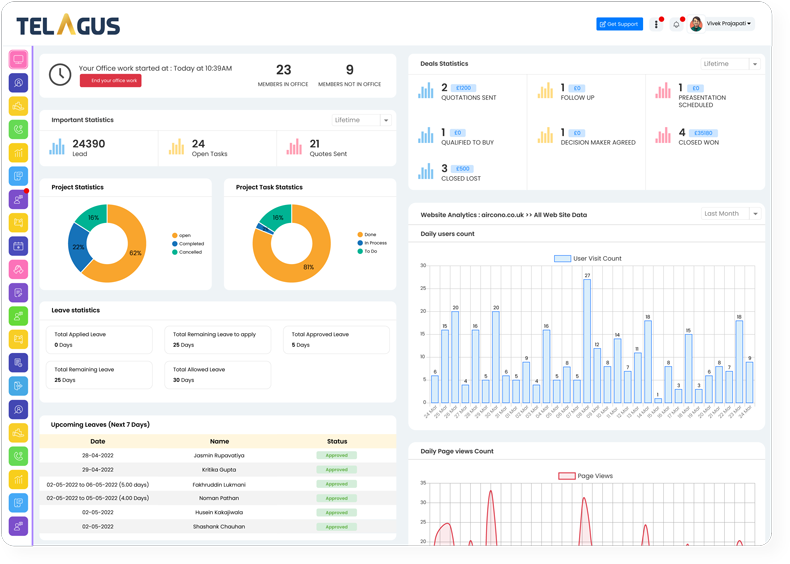
Artificial Intelligence (AI) and Machine Learning (ML) Integration
The integration of AI and ML technologies into CRM systems is transforming how small businesses interact with their customers. These advancements enable CRM platforms to analyze large datasets quickly, recognising patterns and trends that can inform business decisions. For instance, predictive analytics can forecast customer behaviour, helping small business owners anticipate needs and tailor their marketing strategies accordingly. As more CRM systems adopt AI-driven features, such as chatbots for customer interaction or automated lead scoring, businesses can enhance their efficiency and improve overall customer satisfaction. The ongoing evolution of AI and ML in CRM signifies a shift towards more data-driven decision-making, allowing small businesses to compete effectively in an increasingly tech-savvy marketplace.
Mobile CRM
With the continued rise in remote and mobile work, incorporating mobile CRM capabilities has become crucial for small businesses. These systems allow users to access customer information and manage operations from anywhere, at any time. Additionally, mobile apps provide real-time updates on customer interactions and sales activities, enabling business owners to stay connected with their team and customers no matter where they are. As more people rely on smartphones and tablets as their primary devices, integrating mobile CRM into business operations will be essential for staying competitive in the future.
Personalization through Data Centralization
As more businesses collect vast amounts of data through various channels like social media, email marketing, and website analytics, centralizing this information is vital for effective personalization. By consolidating all customer data into a single location, CRM systems can provide a comprehensive view of customer interactions and preferences, allowing businesses to tailor their marketing efforts accordingly. With the increasing importance of personalized experiences for customers, centralizing data through CRM systems will be essential for small businesses’ success.
Social media has become a powerful tool for businesses to connect with potential customers and retain existing ones. As such, integrating social media platforms with CRM systems provides valuable insights into customer behaviour and preferences. Businesses can track interactions on social media, gather feedback from customers, and engage in targeted marketing campaigns using this information. The integration of social media with CRMs is expected to continue growing as businesses recognize the value of social media in building and maintaining customer relationships.
Virtual Reality (VR) and Augmented Reality (AR) Capabilities
VR and AR technologies have been gaining traction in recent years, offering immersive experiences for customers. As these technologies develop, we can expect to see more CRM systems incorporating them into their platforms. For small businesses, this means being able to offer personalized product demonstrations or virtual tours of their services through VR or AR. These interactive capabilities will enhance customer experiences and provide a competitive edge for small businesses that adopt them.
Conclusio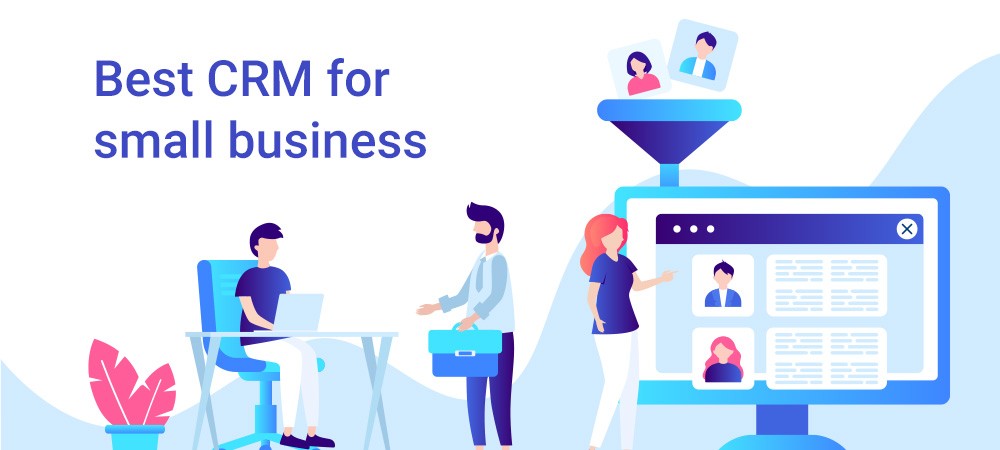
CRM systems are constantly evolving to meet the changing needs of businesses and consumers. With the increasing importance of data-driven decision-making and personalized experiences, small businesses must stay updated on the latest CRM trends to remain competitive. From AI integration to social media and VR/AR capabilities, these advancements offer endless possibilities for enhancing customer relationships and driving business growth. By leveraging CRM systems’ full potential, small businesses can streamline operations, improve efficiency, and deliver exceptional customer experiences in today’s fast-paced digital landscape. So, it is crucial for businesses of all sizes to stay informed about emerging technologies and trends in the world of CRM to adapt and thrive in the future. With an effective CRM strategy in place, small businesses can continue building strong relationships with their customers while staying ahead of the competition. Now go forth and embrace the future of CRM for your small business! Happy customer relationship managing!
So, it is important for businesses to continuously stay informed about emerging technologies and trends in the world of CRM to adapt and thrive in the future. By embracing these advancements, small businesses can streamline operations, improve efficiency, and deliver exceptional customer experiences in today’s fast-paced digital landscape.
